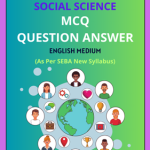SEBA Class 6 Social Science MCQ Chapter 21 Concept of a Government and Various Types of Government Solutions in English Medium, Class 6 Social Science Multiple Choice Question Answer to each chapter is provided in the list so that you can easily browse throughout different chapters SEBA Class 6 Social Science MCQ Chapter 21 Concept of a Government and Various Types of Government Question Answer and select need one.
SEBA Class 6 Social Science MCQ Chapter 21 Concept of a Government and Various Types of Government
Also, you can read the SCERT book online in these sections SEBA Class 6 Social Science Objective Type Solutions by Expert Teachers as per SCERT (CBSE) Book guidelines. These solutions are part of SCERT All Subject Solutions. Here we have given Assam SEBA Class 6 Social Science MCQ Solutions for All Subject, You can practice these here.
Concept of a Government and Various Types of Government
Chapter – 21
| MCQ |
1. What is a government?
(a) A body of individuals who make, enforce, and interpret laws.
(b) A group of private citizens.
(c) An organisation that runs businesses.
(d) A social club.
Answer: (a) A body of individuals who make, enforce, and interpret laws.
2. Which of the following is a type of government?
(a) Monarchy.
(b) Anarchy.
(c) Oligarchy.
(d) All of the above.
Answer: (d) All of the above.
3. In a democracy, who holds the ultimate power?
(a) The king.
(b) The military.
(c) The people.
(d) The wealthy.
Answer: (c) The people.
4. What is a monarchy?
(a) Government by the people.
(b) Government by a single person, usually a king or queen.
(c) Government by a small group.
(d) Government without laws.
Answer: (b) Government by a single person, usually a king or queen.
5. Which type of government is ruled by a small group of people?
(a) Democracy.
(b) Oligarchy.
(c) Monarchy.
(d) Anarchy.
Answer: (b) Oligarchy.
6. What is an anarchy?
(a) A system with no government.
(b) A government ruled by a monarch.
(c) A type of democratic government.
(d) A system ruled by a small group.
Answer: (a) A system with no government.
7. Which form of government is characterised by rule through elected representatives?
(a) Monarchy.
(b) Dictatorship.
(c) Representative democracy.
(d) Oligarchy.
Answer: (c) Representative democracy.
8. In which type of government does a single person hold all the power, often taken by force?
(a) Democracy.
(b) Monarchy.
(c) Dictatorship.
(d) Oligarchy.
Answer: (c) Dictatorship.
9. What is the main characteristic of a direct democracy?
(a) People elect representatives to make decisions.
(b) Decisions are made directly by the people.
(c) A monarch makes all the decisions.
(d) A small group of people make decisions.
Answer: (b) Decisions are made directly by the people.
10. Which of the following is a feature of a republic?
(a) Rule by a monarch.
(b) Rule by the people through elected representatives.
(c) Rule by the military.
(d) Rule by a religious leader.
Answer: (b) Rule by the people through elected representatives
11. Which type of government is characterised by the separation of church and state?
(a) Theocracy.
(b) Democracy.
(c) Oligarchy.
(d) Monarchy.
Answer: (b) Democracy.
12. In which system of government are the laws of the country based on religious texts?
(a) Democracy.
(b) Theocracy.
(c) Monarchy.
(d) Oligarchy.
Answer: (b) Theocracy.
13. Which form of government allows citizens to participate directly in decision making?
(a) Representative democracy.
(b) Direct democracy.
(c) Monarchy.
(d) Dictatorship.
Answer: (b) Direct democracy.
14. What is the role of a constitution in a democratic government?
(a) To establish a monarchy.
(b) To outline the rights and duties of citizens.
(c) To suppress dissent.
(d) To provide unlimited power to leaders.
Answer: (b) To outline the rights and duties of citizens.
15. In a federal system of government, power is divided between:
(a) Central and state governments.
(b) The monarch and the parliament.
(c) The military and the civilians.
(d) The rich and the poor.
Answer: (a) Central and state governments.




